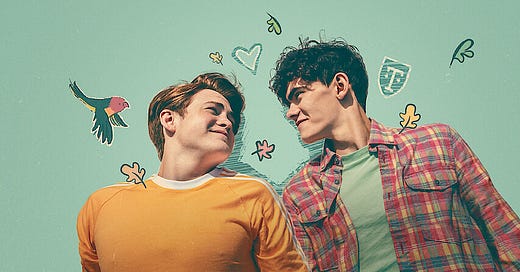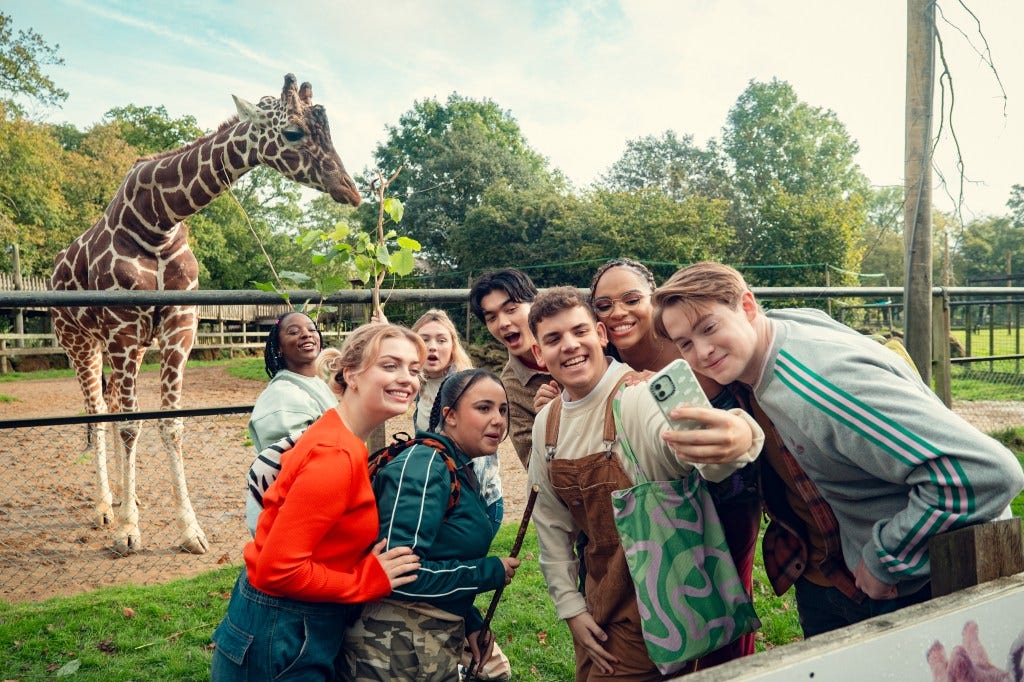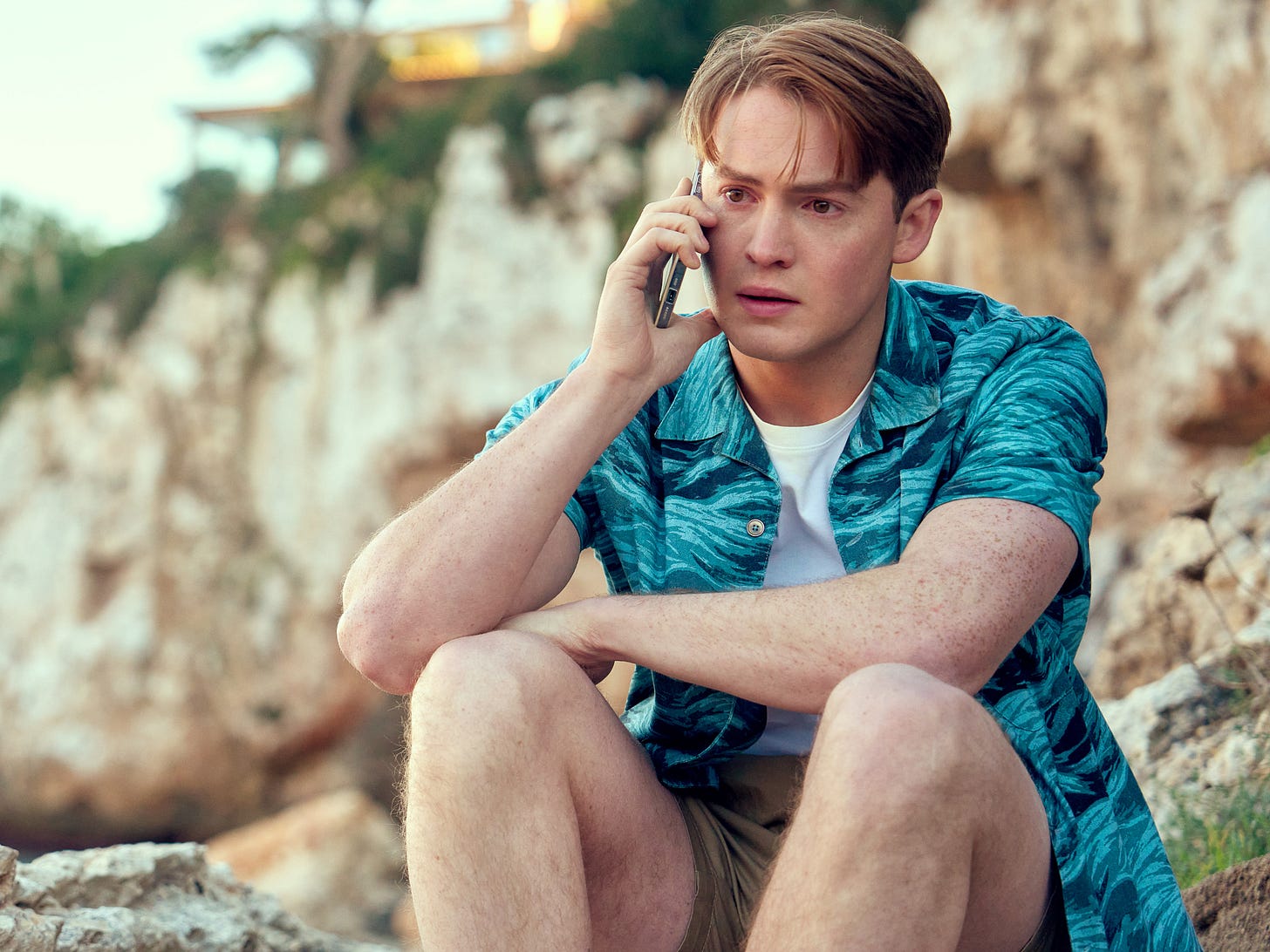I Could Talk About Heartstopper for Hours
Jonathan Bailey said everyone over the age 40 should watch it. He's right. But also, everyone needs to watch it, period.
I think a lot of people, especially adults, dismiss Heartstopper as a legitimate TV show that’s worth watching. It’s a cutesy show marketed for young adults and teenagers, based on graphic novels and comics by Alice Oseman. The premise revolves around Nick Nelson and Charlie Spring, two teenage boys in England who become friends and soon develop a romantic relationship. With this relationship comes Nick realizing he’s bisexual and coming out to his mom, along with some other big milestones for a lot of queer teens and queer people in general. The show is cute, colorful, and uplifting as it tells a story of acceptance amongst the teens. It could get written off so easily in our media landscape. Somehow, it’s been a huge hit. And while I’m not always one for those cutesy stories, I absolutely love it. Here’s why:
LGBTQ+ Diversity
Heartstopper is, based on its premise alone, a show that showcases a diversity in sexuality. Nick (played by Kit Connor) is bisexual and Charlie (played by Joe Locke) is gay, two things that we just don’t see onscreen often enough. The show could just stop there and let those two be the only representation that it offers, but it doesn’t. Most of the main cast of characters are queer or in queer relationships. The character of Elle (Yasmin Finney) is a transgender girl and is — miraculously — portrayed by a transgender actress. Darcy (Kizzy Edgell) and Tara (Corinna Brown), two more of Charlie’s friends, are both lesbians and are in a relationship. And (spoilers for season 3, look away if you haven’t watched it) Darcy has their own gender exploration journey portrayed on the show. That’s not even all of it, that’s just some of the examples off the top of my head. The best part of it, to me, is that none if it feels forced. Yes, there are coming out arcs and there’s a bit of homophobia from one of the antagonists, but it doesn’t feel like it’s too much. Besides, this is a show designed for teenagers, it could be their first introduction to such storylines. Not everyone is as bored by them as the adults in the room, and I think we have to remember that sometimes.
I remember when the second season (I think) came out, a lot of people who didn’t like the show were ragging on it because Nick was “constantly” reminding everyone, “I’m bisexual, actually”. Apparently it was cringy or something. I don’t know. The thing is, having to repeat yourself over and over like that is the lived experience of anyone who has ever identified as bisexual at any point in their lives. Bisexuals are more likely to be lumped in with either straight people or gay people, without being seen as their full identity. So, good on you, Nick. Keep saying it, for all the bisexuals out there.
The third season (again, spoilers) also had a storyline where Isaac (Tobie Donovan) discovered he was asexual — another highly underrepresented sexuality. His preference for books over romance and his lack of romantic interest could have been played off entirely as a joke, but it wasn’t. His friends, upon discovering that they’d been excluding him by making assumptions about his romantic interests, ended up taking him seriously and wanting to learn more about it so they could include him better.
I don’t think I can name another show that not only has this level of representation in it that also treats it this well. These characters are not forced or one-dimensional. They all have lives and interests outside of their sexualities. And the best part? They all accept each other for who they are. Honestly, I just want more of that on my screen, all the time.
Mental Health
Besides the amazing queerness of Heartstopper, one of the biggest storylines comes in the form of Charlie’s struggle with his mental health and ultimately an eating disorder. If you’ve never seen the show, I’m sure that feels like a shock after what I’ve described to you so far. Yep, such an uplifting show has the capability of taking on serious topics, too! And it does so with such love and care.
I can’t speak on the portrayal of an eating disorder because I’ve never had one and neither has anyone that I am currently close to. I don’t have enough experience with it to tell you if it’s “correct” or not in its portrayal. But I can tell you that it was the first time I’d ever seen a male character have an eating disorder, and that felt really powerful. I hope that this show teaches boys (and people in general) that eating disorders aren’t just something that happens to girls. They can happen to anyone, for any number of reasons. It’s nothing to be ashamed of, even if your version of the disorder isn’t like someone else’s. Charlie deserved the love and help that he got, and so does anyone else struggling with it, no matter what gender they are.
While I can’t speak on eating disorders and the extreme mental health issues that Charlie went through, I feel like I can speak on what Nick went through. No, I’ve never been the romantic partner of someone going through all of that. But I have been close to people who, when we were teenagers, were going through similar things to Charlie. Nick is so supportive of Charlie, all the time. He’s a good boyfriend, maybe the best boyfriend. Even in the darkest times, all he does is care about Charlie without judgement. But that doesn’t mean it doesn’t weigh on him. That side of Nick was something that I deeply appreciated about this show. They didn’t ignore his side of things like so many shows will. The scene of Nick in season 3, opening up to his aunt about how he worried he is that he isn’t enough to help Charlie, lives in my head rent free. I’m including the full clip here because it is so powerful.
I think a lot of people experience this, with friends or partners or just other people they care about. And it’s always difficult, but especially when you’re young. The reality is that Nick and Charlie are young. They’re still kids at the end of the day. And for either of them to be dealing with what they are is not something that a kid should have to handle. But sometimes they do. And after a lot of hard work and communication, Nick and Charlie end up stronger than ever. I know the title of this is “I Could Talk About Heartstopper for Hours” but truthfully I could also just talk about Nick Nelson for hours.
Acceptance
One of the biggest criticisms I’ve seen for Heartstopper is that it “wasn’t realistic” and that everyone was “too accepting”. It got me thinking about how sad of a statement that is. Okay, so maybe it isn’t realistic to many people’s lived experiences in that sense. But it could be. How many people would lead with love more if they saw it on their TVs more? How many people look at Nick and Tara’s friendship and think “I want to have a friendship like that, maybe I should do something about it”? I’m not saying that you can control how accepting or not your friends are, but I am saying that you can control how accepting you are. I’m a firm believer in putting love and joy out into the world, and that it can and will make a difference. I think that watching a show like this that portrays what it means to be a good friend can actually teach people how to create a world like that. If everyone said to themselves, “not everyone is this kind so I’m also going to give up being kind” then no one would ever be kind and everything would suck.
I think I’m losing the point of what I was trying to say.
Here’s something else that might lead to a point: A lot of times, we wonder about how influential the media is as far as how people exist in the world around them. Do action movies make men more violent? Do feel-good flicks make us want to be better people? Can media influence the way people behave in their day to day lives that much? Well… yeah.
I live in a bit of a bubble, having grown up in a fairly progressive city (that I am still living in), so I didn’t actually realize just how much of my generation is affected by the rise of alt-right media. Then the 2024 election happened and I finally had to face that reality. Some of my friends who are teachers have noticed a growing misogyny problem in young boys, likely stemming from very popular alt-right personalities like Andrew Tate being so accessible. I’m so sorry to mention his name in an article about Heartstopper, but stick with me here. My question is: If people like him can make people objectively wosre simply by consuming his content, can we also do the opposite?
If we promoted and consumed media like Heartstopper more, could we start to normalize the things portrayed in it? Could we make acceptance and love for one another a gut reaction instead of something that has to be taught and drilled into our skulls at every turn? I don’t know. But I’d like to try.
Conclusion
I’m not saying Heartstopper is perfect. It has flaws just like everything else. I’m also not saying it’s a show that everyone will enjoy. You don’t have to love it. You don’t have to even like it that much. Just give it a try.








this is a great post! i could also talk about nick nelson for hours, i love him!!